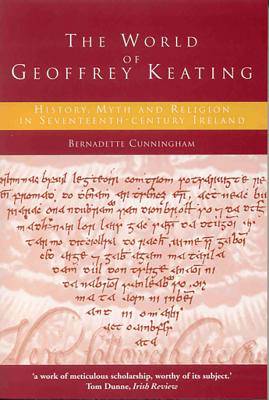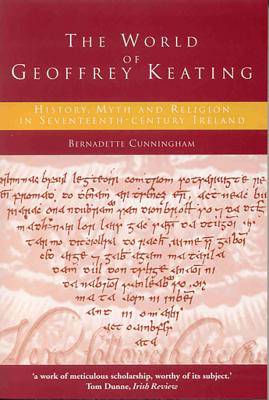
- Afhalen na 1 uur in een winkel met voorraad
- Gratis thuislevering in België vanaf € 30
- Ruim aanbod met 7 miljoen producten
- Afhalen na 1 uur in een winkel met voorraad
- Gratis thuislevering in België vanaf € 30
- Ruim aanbod met 7 miljoen producten
Zoeken
The World of Geoffrey Keating
History, Myth and Religion in Seventeenth-Century Ireland
Bernadette Cunningham
Paperback | Engels
€ 27,95
+ 55 punten
Omschrijving
Geoffrey Keating's Foras Feasa ar Eirinn was among the most popular and influential histories ever written. It offered a sense of Ireland, of Irishness, and of Catholicism that had wide appeal. The work has long been valued for its mastery of the Irish language and its attractive literary style, yet its significance as history has been ignored. This innovative book, now available in paperback, evaluates Keating's role as both historian and theologian, providing an imaginative interdisciplinary analysis of the entire range of Keating's writing and of the social circumstances and intellectual influences that moulded his world. The world of scribes, translators, publishers and readers of Keating's works are part of this historiographical assessment of how ideas were transmitted to later generations. Geoffrey Keating's intellectual legacy in influencing perceptions of Irishness has been profound, not least as the popularizer of the idea of a 'special relationship' between Catholicism and Irishness. This is an important, original study of the cultural, social and intellectual world of Ireland's most influential seventeenth-century writer.
Specificaties
Betrokkenen
- Auteur(s):
- Uitgeverij:
Inhoud
- Aantal bladzijden:
- 263
- Taal:
- Engels
Eigenschappen
- Productcode (EAN):
- 9781851828067
- Verschijningsdatum:
- 9/07/2004
- Uitvoering:
- Paperback
- Formaat:
- Trade paperback (VS)
- Afmetingen:
- 155 mm x 231 mm
- Gewicht:
- 430 g

Alleen bij Standaard Boekhandel
+ 55 punten op je klantenkaart van Standaard Boekhandel
Beoordelingen
We publiceren alleen reviews die voldoen aan de voorwaarden voor reviews. Bekijk onze voorwaarden voor reviews.







